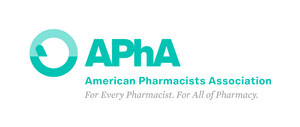WASHINGTON, Nov. 21, 2011 /PRNewswire-USNewswire/ -- As the winter travel season approaches, the American Pharmacists Association encourages consumers to talk with their pharmacist about their medications before they pack their bags. This will help ensure each person knows the best way to pack their medications, what to do if the medication is lost and anything to be aware of with travel and the medication. The short conversation could save each person a lot of holiday trouble further down the road if they do not prepare correctly.
(Logo: http://photos.prnewswire.com/prnh/20100820/APHALOGO-a)
Americans are known to travel a lot during the holiday and winter season. According to the Bureau of Transportation and Statistics, the number of long distance trips – more than 50 miles – just during the six-day Thanksgiving travel period, increases by 54 percent. Travel disrupts healthcare routines and the normal things consumers do to take care of themselves – such as adhering to a medication regimen – can sometimes fall from the top list of priorities.
Here are some tips to help you maintain a healthy medication regime throughout the travel season:
- Organize a health kit that contains all of your prescription and over-the-counter medications, herbal supplements, vitamins and minerals. Ensure you store medications correctly and pack ample medication and equipment. Some medications have special storage instructions or require specific dosing equipment. If you will be flying to your destination or crossing borders, always carry your medications in the original bottles in your carry-on luggage.
- Bring more medication than you expect to use. Talk to your pharmacist about the possibility of obtaining a medication "vacation supply" from your insurance company, he/she may be able to help. Being prepared for unexpected extended travel helps ensure safe and effective medication use. It is also good to know your insurance company's policy on medication transfers and replacement supplies if your medication is lost.
- Pack a "Preventative Medicine" Kit. Talk with your pharmacist about any over-the-counter medications you should pack for the area of the world you are traveling to or what you are planning to do. Basics include: anti-diarrhea, anti-nausea, antihistamine, anti-motion sickness, mild laxative or stool softener, medicine for pain or fever and antibacterial/antifungal cream/ointment.
- Get up-to-date on any vaccines you may need. Over the holiday season you will run into many people who could possibly be sick. Make sure to get your annual flu shot. If you are traveling overseas, make sure you have met all of the travel vaccine recommendations put out by the CDC.
- Beware of "Drugged Driving." Certain medications can impair perception, judgment and reaction times causing a hazardous driving situation. Talk with your pharmacist about side effects your medication may cause and whether you can adjust your dosing schedule to avoid times you may need to operate a vehicle.
- Carry an updated personal medication and vaccination record with you. This is a list of your prescription, over-the-counter and herbal medications, how you take them, and why. This list should also contain an up-to-date history of your vaccinations. If you are unexpectedly admitted into a hospital, or must see a healthcare provider while traveling, the list can help them understand your current treatments. To download a personal medication list www.pharmacist.com/pmr.
- Have a plan for adjusting your medication regimen. Travel may require you to adjust your medication regimen, or when you take your medication, for time and routine changes. If you are traveling across the country and would normally take a medication twice a day, for example, you may need to adjust that schedule to take your medications approximately twelve hours apart—which may be earlier or later than your first bedtime or morning on another coast. Ask your pharmacist about how to alter your schedule to fit your health-care needs.
- Be careful or avoid drinking alcohol, especially when flying or visiting cities in higher altitudes. Alcohol can interact with many prescription and over-the-counter medicines.
- Ask your pharmacist if there are any foods or beverages that conflict with your medicines. You may be more inclined to eat unfamiliar foods when traveling to new cities or foreign countries.
- Practice good hygiene, get rest and eat well. Frequent hand-washing/cleansing, use of alcohol-based hand sanitizer and coughing /sneezing into your sleeve or a tissue will protect you and others. In addition, try not to overdo it and not get run down, eat right and drink plenty of water (and depending upon the location you may need to use bottled water) are good practices that can reduce your risk of getting sick.
About the American Pharmacists Association
The American Pharmacists Association, founded in 1852 as the American Pharmaceutical Association, is a 501 (c)(6) organization, representing more than 62,000 practicing pharmacists, pharmaceutical scientists, student pharmacists, pharmacy technicians and others interested in advancing the profession. APhA, dedicated to helping all pharmacists improve medication use and advance patient care, is the first-established and largest association of pharmacists in the United States.
SOURCE American Pharmacists Association
WANT YOUR COMPANY'S NEWS FEATURED ON PRNEWSWIRE.COM?
Newsrooms &
Influencers
Digital Media
Outlets
Journalists
Opted In






Share this article